Introduction
As WhatsApp crosses over 2 billion users, integrating conversational AI with this leading messaging platform is becoming imperative for customer service.
According to Gartner, WhatsApp inquiries have increased over 175% since the pandemic as customers seek timely assistance. In fact, 95% of users expect a response within 5 minutes on WhatsApp as per a recent Buffer study.
To meet these rising expectations, businesses need intelligent WhatsApp customer support chatbots that can handle common inquiries, direct complex issues to agents and drive self-service.
As WhatsApp usage grows across generations, offering customer service in a preferred channel as customer support chatbot is key for brand affinity. With the right chatbot solution tailored to your workflows, transforming CX and support over WhatsApp is achievable.
But how to choose the right whatsapp customer support chatbot that fits your needs like a glove?
If you’re asking the same question, then this article is for you. Continue reading as we’ll explore how to choose the right customer support chatbot for WhatsApp.
Choosing the Right WhatsApp Customer Support Chatbot: Factors to Consider
WhatsApp's massive global userbase makes it an essential customer service channel for businesses today. However, implementing WhatsApp support requires the right strategy and tools to drive results.
When evaluating WhatsApp chatbot solutions for customer service, here are key factors to consider:
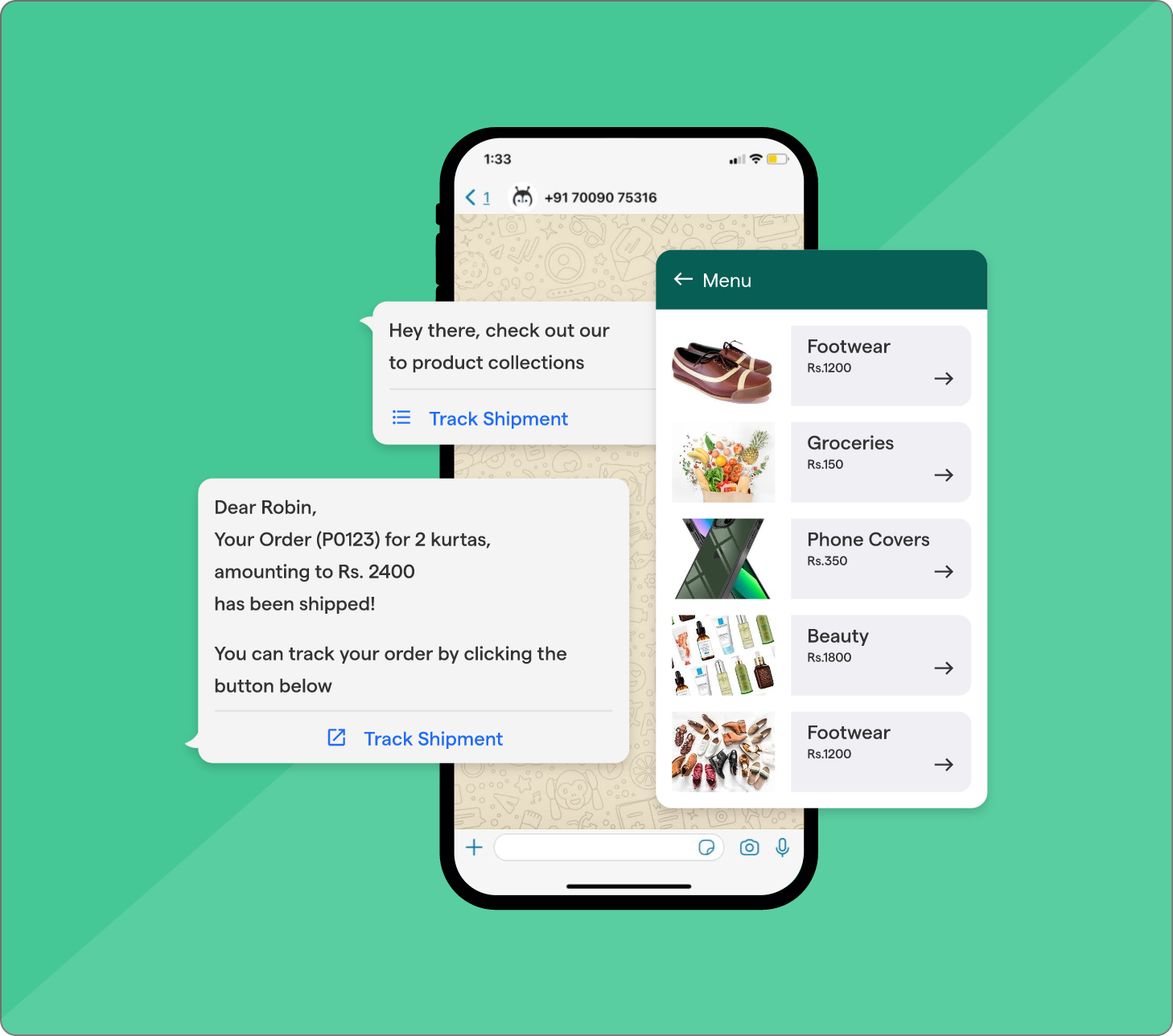
Scalability
Look for a platform that can easily scale support across large volumes of customer conversations without compromising speed or quality.
Prioritize solutions with the capacity and reliability to handle increased demand.
Conversation Customization
The ability to customize conversations with tailored questions, logical branching, and automated triggers allows for more natural, contextual interactions. Seek chatbots that provide control to personalize flows.
Conversation History
Your chatbot should maintain full histories of past conversations with each customer to provide continuity and context in new interactions. This is essential for quality ongoing support.
Handover to Agents
When conversations reach the limits of automation, your chatbot must be able to smoothly transfer chats to human agents. This combination empowers around-the-clock support.
Analytics & Reporting
Robust analytics around chat metrics, user demographics, conversation sentiment, and content performance allow for data-driven optimization. Prioritize platforms with powerful analytics.
Omnichannel Integration
Look for solutions that allow you to seamlessly extend your WhatsApp chatbot capabilities into other messaging channels like Facebook Messenger for unified experiences.
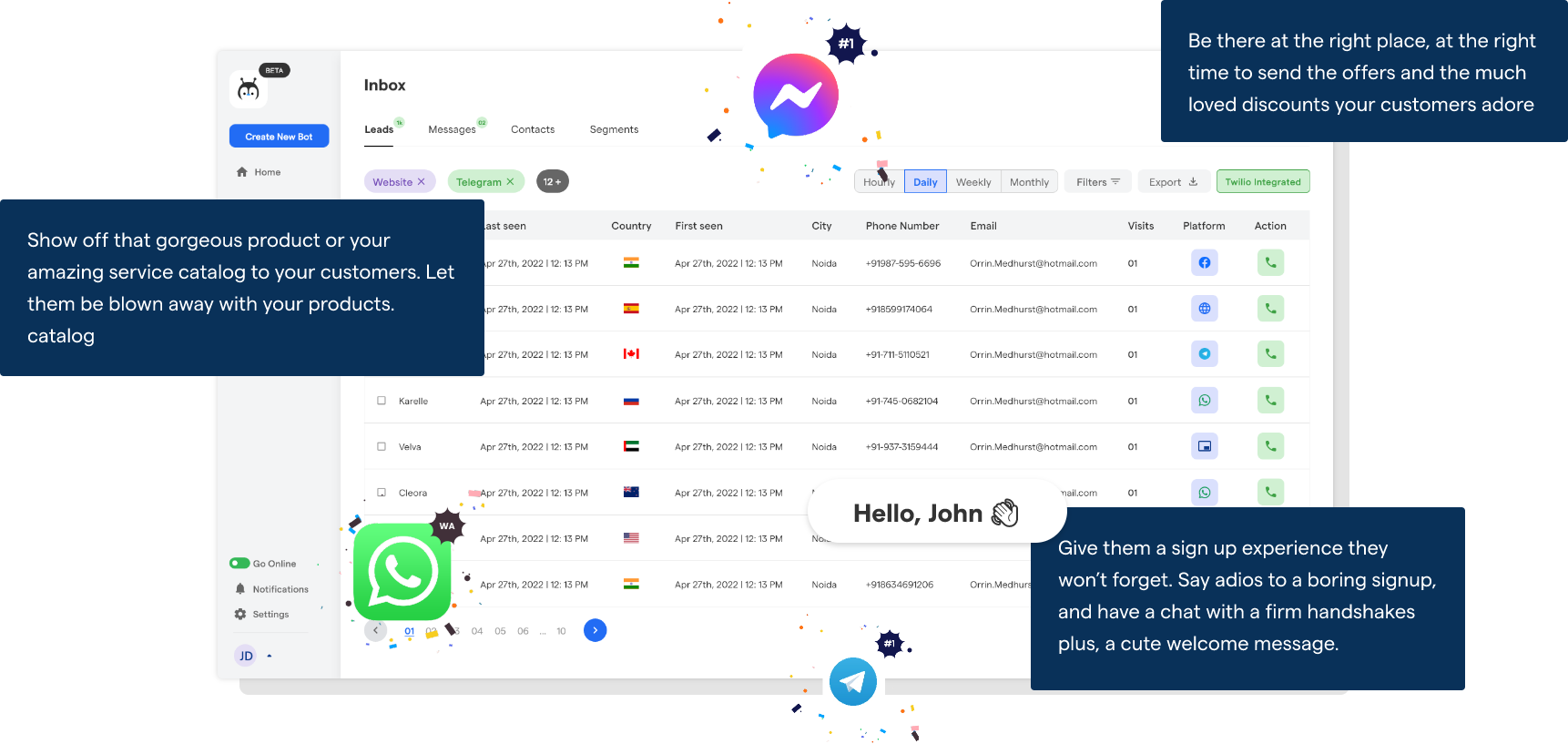
With BotPenguin's omnichannel platform, businesses can deliver streamlined 24/7 customer experiences over any digital touchpoint. Our solutions unify siloed channels into a single intelligent customer engagement layer.
Security & Compliance
Your provider must offer enterprise-grade security, encryption, and compliance with regulations like PCI DSS, ISO, SOC2, GDPR, and CCPA to ensure safety.
Quick Deployment
Opt for intuitive, no-code platforms that allow anyone on your team to visually build and manage AI chatbots without relying on developers. This speeds time to value.
Rich Content
Supporting images, files, location sharing and other rich messaging functionality creates more engaging, media-forward conversations aligned with WhatsApp user expectations.
24x7 Reliability
There should be no downtime interrupting your chatbot's availability and losing customers. Seek solutions with proven uptime and reliability.
By evaluating options using criteria like these, you can determine the ideal WhatsApp customer support chatbot tailored to your business needs and ready to deliver standout user experiences.
Customization and Personalization Options
Your chatbot should reflect your brand's personality and style. Look for customization and personalization options that allow you to tailor the chatbot's responses and appearance to match your brand identity. From the color scheme to the tone of voice, make sure the chatbot seamlessly integrates into your overall customer experience.
Platforms like BotPenguin provide the right WhatsApp customer support chatbot with customization and personalization options. It also stays ahead with the latest WhatsApp feature updates to maximize functionality.
Analytics and Reporting Features
Data is power, my friend! Make sure your chosen chatbot comes equipped with robust analytics and reporting features. This means you'll have access to insightful data on customer interactions, response times, frequently asked questions, and more. These analytics will help you identify areas for improvement and optimize your chatbot's performance over time.
Suggested Reading:
Choosing the Right WhatsApp Customer Support Chatbot: Types of Chatbots
Now that you've assessed the factors to consider when choosing a WhatsApp customer support chatbot, let's dive into the different types of chatbots available. Each type has its own unique characteristics and benefits.
Template-Based Chatbots
Template-based chatbots, also known as rule-based or scripted chatbots, follow predefined rules and workflows. They work well for businesses with straightforward customer interactions and frequently asked questions.
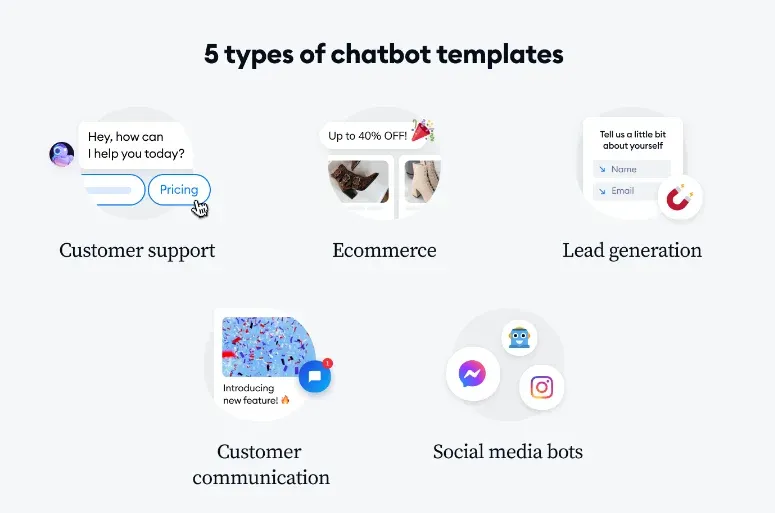
Pros:
Given below are the pros of template based chatbots:
- Quick and easy setup: With predefined templates, these chatbots can be deployed relatively quickly.
- Cost-effective: Template-based chatbots are often more affordable, making them a great entry-level solution.
Cons:
Given below are the cons of template based chatbots:
- Limited flexibility: Template-based chatbots may lack the flexibility to handle unexpected or complex queries, leading to a less personalized user experience.
- Limited learning capabilities: These chatbots rely on predefined rules and do not possess the ability to learn from user interactions.
AI-Powered Chatbots
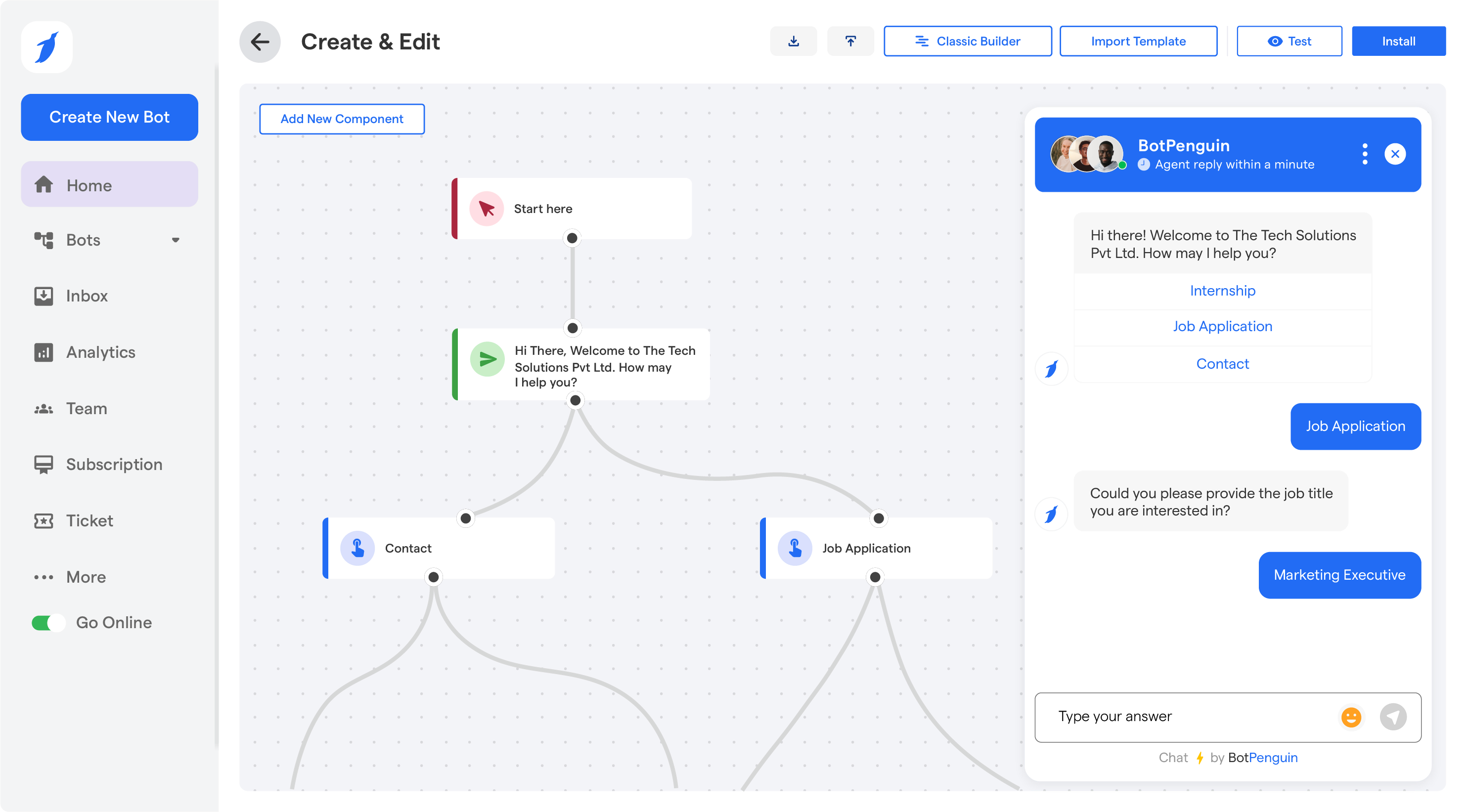
AI-powered chatbots, also referred to as natural language processing (NLP) chatbots, utilize artificial intelligence to understand and respond to user queries. By leveraging machine learning algorithms, these chatbots continually learn from user interactions, improving their responses over time.
For example, BotPenguin is an AI-powered chatbot platform that provides customer support chatbots for WhatsAPP. Seamlessly integrate your WhatsApp with backend systems through BotPenguin's APIs and CRM connectors. You can facilitate secure payments, share media and documents, leverage user data, and more to provide personalized assistance. Handovers to human agents ensure no query goes unresolved.
And the tech for BotPenguin just doesn't stop there. It makes sure that you reach your customers where they are by offering chatbots for multiple platforms, thus making omnichannel support look easy:
Pros:
Given below are the pros of AI powered chatbots:
- Natural language understanding: AI-powered chatbots can comprehend complex user queries, allowing for more natural and conversational interactions.
- Continuous improvement: These chatbots learn from every conversation, becoming smarter and more accurate in their responses.
Cons:
Given below are the cons of AI powered chatbots:
- Higher development complexity: Implementing AI-powered chatbots requires more time and expertise, as they involve training the chatbot on large amounts of data.
- Higher costs: The development and maintenance of AI-powered chatbots can be more expensive due to the computational power required.
Hybrid Chatbots
Hybrid chatbots combine the best of both worlds by combining the rule-based approach of template-based chatbots with the advanced capabilities of AI-powered chatbots. These chatbots use predefined rules for standard queries but employ AI algorithms for handling more complex or unfamiliar questions.
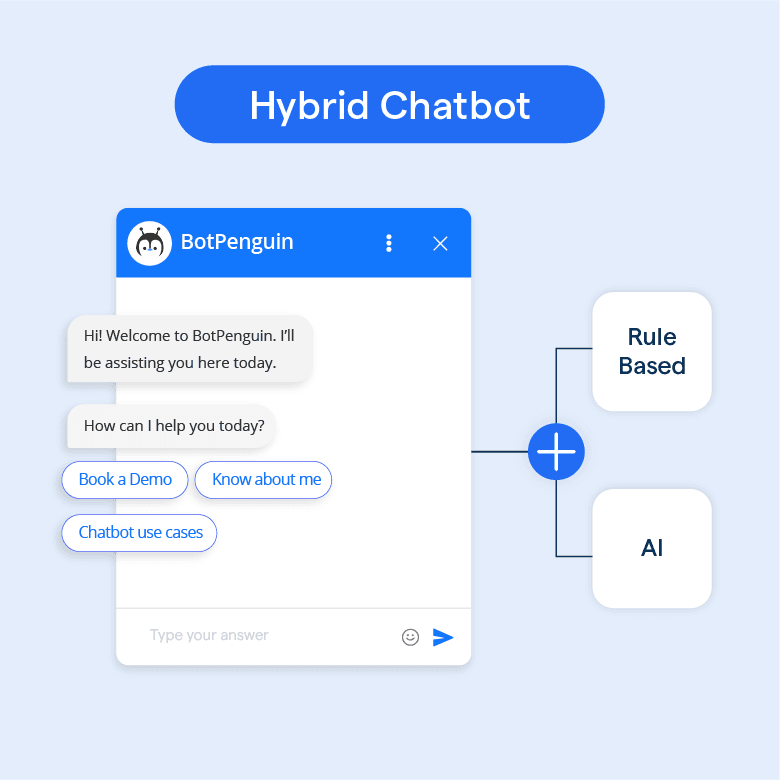
Pros
Given below are the pros of hybrid Chatbots:
- Flexibility and scalability: Hybrid chatbots offer a balance between flexibility and scalability. They can handle both routine and unexpected queries effectively.
- Improved user experience: By leveraging AI for more complex queries, hybrid chatbots provide a more personalized and human-like interaction.
Cons
Given below are the cons of hybrid Chatbots:
- Development complexity: Building and training a hybrid chatbot require a higher level of expertise and resources compared to template-based chatbots.
- Cost considerations: The additional development complexity may result in higher upfront costs for implementing a hybrid chatbot.
Evaluating the Pros and Cons of Each Type
When choosing the type of WhatsApp chatbot, it's crucial to evaluate your specific business needs and requirements. Here are a few questions to consider:
- Is your customer support process relatively straightforward, or do you encounter a wide range of query types?
- Do you have the resources and expertise to develop and maintain an AI-powered chatbot?
- How personalized do you need the customer experience to be?
Suggested Reading:
Mastering Customer Support on WhatsApp: Best Practices & Tips
Finding the Perfect Provider and Implementing the WhatsApp Chatbot
Explore the essential steps involved in selecting a chatbot provider and successfully integrating the chatbot into your customer support process.
Researching Available Providers
To find the perfect WhatsApp chatbot provider, start by researching the options available in the market. Look for providers that specialize in WhatsApp chatbot solutions and have a good reputation in the industry. Consider factors such as experience, customer base, and the range of features they offer.
With BotPenguin's user-friendly chatbot builder, you can quickly create AI-powered bots tailored for WhatsApp's unique interface. Our platform is engineered specifically for the growing demands of conversational commerce and support over messaging apps.
Comparing Features and Pricing
Once you have identified a few potential providers, it's time to compare their features and pricing. Evaluate the key functionalities they offer and see if they align with your customer support needs.
Look for features like automation capabilities, integration options, analytics and reporting, customization options, and scalability. It's also essential to consider the pricing structure and ensure that it fits within your budget.
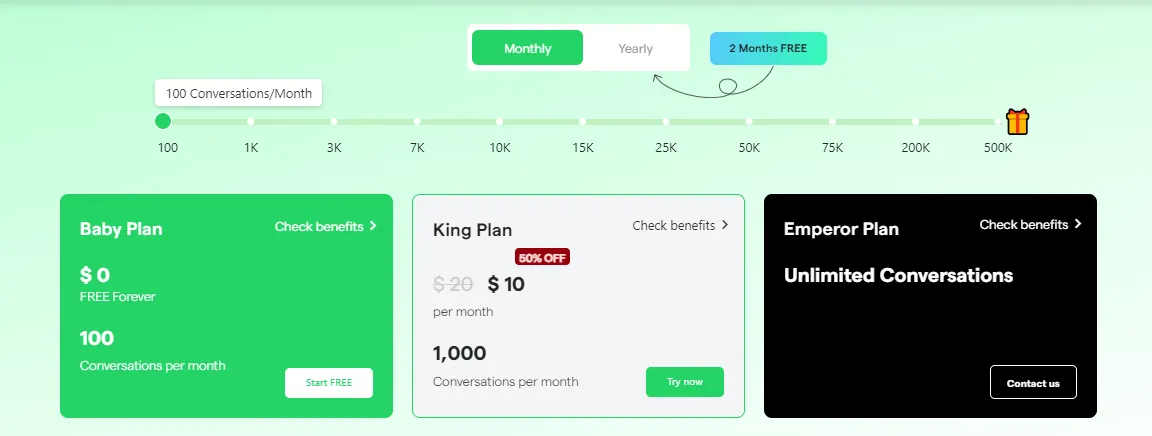
Reading Customer Reviews and Testimonials
To gain insights into the performance and reliability of a chatbot provider, read customer reviews and testimonials. Check out review platforms, social media channels, and the provider's website for feedback from their existing clients.
Requesting Demos and Trials
Before making your final decision, it's crucial to see the chatbot in action. Request demos and trials from your shortlisted providers. This will allow you to experience the chatbot's capabilities firsthand and assess its user interface, ease of use, and overall performance. Be sure to involve your customer support team in the evaluation process to get their feedback as well.
Implementation and Integration
Once you have selected the ideal chatbot provider, it's time to implement and integrate the chatbot into your customer support process. Here are two crucial steps to follow:
Setting Up a WhatsApp Business Account
Follow the guidelines provided by WhatsApp to create an official business profile. This will enable you to communicate with customers via WhatsApp and access the necessary APIs for chatbot integration.
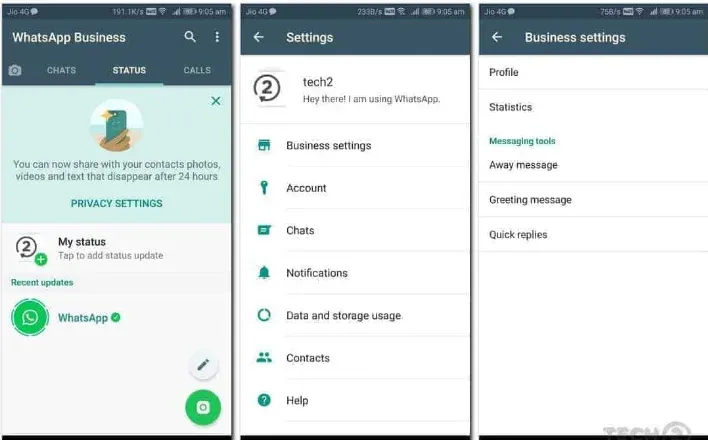
Integrating the Chosen Chatbot with Your Existing Systems
To ensure a seamless customer support experience, integrate the chosen chatbot with your existing systems. This could include your CRM software, helpdesk platform, or other tools you use to manage customer interactions. This integration allows your chatbot to access and update customer information, create support tickets, and route inquiries effectively.
Once the integration is complete, thoroughly test the chatbot to ensure it behaves as expected and meets your customer support goals.
Conclusion
With widespread consumer adoption, adding WhatsApp as a customer service channel is now a necessity for forward-thinking brands. Yet simply activating a basic business profile delivers limited capabilities. To truly transform customer experiences requires an effective WhatsApp strategy backed by robust tools and partners.
Factors like scalability, compliance, analytics, and ease of use determine which solutions can drive results on the platform versus underdelivering. By following the evaluation criteria and best practices covered in this guide, you can determine the right fit for your business needs and audience expectations.
The BotPenguin platform makes it easy to create advanced, customized WhatsApp chatbots for customer support and other uses without coding. With BotPenguin, any team can visually build and manage AI-powered bots on WhatsApp and other messaging channels.
Sign up today to start strengthening customer relationships with seamless WhatsApp messaging powered by BotPenguin.
Frequently Asked Questions (FAQs)
What are the key features to consider when choosing a WhatsApp customer support chatbot?
Key features include conversational abilities, multilingual support, integration with CRM systems, customization options, analytics capabilities, and seamless handover to human agents, ensuring a comprehensive and efficient customer support experience.
How can businesses assess the compatibility of a WhatsApp chatbot with their existing systems?
Businesses can assess compatibility by evaluating the chatbot's integration capabilities, checking for API support, and ensuring smooth synchronization with their current customer support infrastructure, allowing for a seamless and streamlined integration process.
Can businesses customize the conversation flow of a WhatsApp chatbot according to their specific requirements?
Yes, businesses can customize the conversation flow by defining specific user paths, incorporating personalized responses, and integrating industry-specific terminology or information. This ensures that the chatbot aligns with the brand's voice and caters to the unique needs of the customers.
What security measures should businesses consider when selecting a WhatsApp customer support chatbot?
Businesses should prioritize data security by selecting a chatbot with robust encryption protocols, secure data storage, and compliance with data protection regulations. This ensures the confidentiality and privacy of customer information shared during support interactions.


